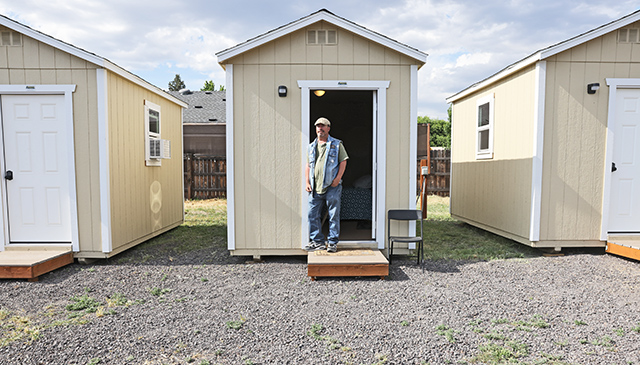Bend poet Matthew Friday the late-blooming author of a new chapbook
Published 12:30 pm Wednesday, July 24, 2024

- Matthew Friday teaches third grade at Pine Ridge Elementary in Bend, and is the author of the forthcoming poetry collection "The Residents."
Poet Matthew Friday of Bend is someone you might consider a late bloomer — he certainly does.
“Everything in my life is definitely kind of a late-bloomer, but better late than never, right?” the 48-year-old said.
For example, Friday, a British-born third-grade teacher at Pine Ridge Elementary, earned his first driver’s license at age 46 after moving to the U.S. with his wife, Jill, who grew up in Bend.
The two met in Germany and in 2020, during the height of the COVID-19 pandemic, moved to Bend, soon conceiving their first child, their now-15-month-old daughter, Leni-Grace, whom Friday refers to as a miracle.
“After a long time, many years of trying for a child, we come to America — and it’s kind of like a fairytale — and actually have one,” he said last week. “We’re older parents as well, so it’s kind of very unexpected but wonderful.”
Some other recent firsts include home ownership, taking up running of half-marathons and now, his first book of poetry, a chapbook titled “The Residents,” due out this week, possibly next, from Finishing Line Press.
It will be available in local bookstores including Dudley’s Bookshop Cafe, Roundabout Books and Paulina Springs Books.
He’ll present “The Residents” in an event from 11 a.m. to noon Sept. 8 at the East Bend Library.
‘Kind of a total dabbler’
Friday has been writing poetry since his teens.
“I certainly got better as I got older … a mixture of experience, and I read a ton of poetry, just developing my craft,” he said. “I feel like now there’s poems that I’m really happy are out in the world.”
He’s also “kind of a total dabbler” in his own words, a storyteller and writer of scripts and education articles. In England, he studied script writing for film and television, and earned a master’s degree in creative writing. In London, he worked on a TV show for a year and did theater work for about a year.
“Poetry was always a parallel, but it was never really the thing that I was that committed to,” he said. “Then, as the script writing stuff tailed off, poetry just kept going. And poetry became a more consistently successful thing for me — never financially successful, but creatively successful — so I kind of just started doing more and more of that, reading more poetry, engaging more with poetry, and it kind of just took over.”
“The Residents” came about due to a poetry competition he entered. Although his submissions to print and online publications have landed a home with good frequency, he does not generally enter such competitions.
“They’re very expensive,” he said. “You could end up spending a lot of money with very little chance. But I thought, ‘You know, I’ll try. I want to get a little book out there.’
“And then they wrote back and said, ‘You haven’t won, but we want to publish you.’ And I’m like, ‘That’s winning for my books.’”
Living in America
The poems were written during his first couple of years living in America.
“It’s observational … of the world around me, be it people, be it nature, be it interactions between people and people or nature and nature or be and nature,” Friday said.
Nature is Friday’s primary focus,
but some of the poems in the book track his movement through the residency process.
“I’m also looking out and thinking, ‘Well, what does being a resident in the Pacific Northwest mean beyond just
me? What does it mean to the world that I’m now settling into?’” he said. “I like to sort of find myself by looking into the other.”
More than anything, he wants to convey that “The Residents” will appeal to both poetry lovers, and those who may fear it.
“It’s not the kind of poetry that put you off at school,” he said. “You don’t need to dissect this. It doesn’t say there’s not layers, but it isn’t a puzzle. It’s not going to be a mystery that’s going to baffle you. That kind of poetry can really frustrate a lot of readers, and in the past, I’ve seen people frustrated by it, and it saddens me, because then they reject the vast body of accessible, wonderful poetry that can speak to them.”
“I would like to think that my
poetry is kind of a like an invitation to reengage with poetry if you haven’t before,” he said. “I can promise that you may not love every poem, but you’ll definitely understand it, and I think you’ll like it.”






